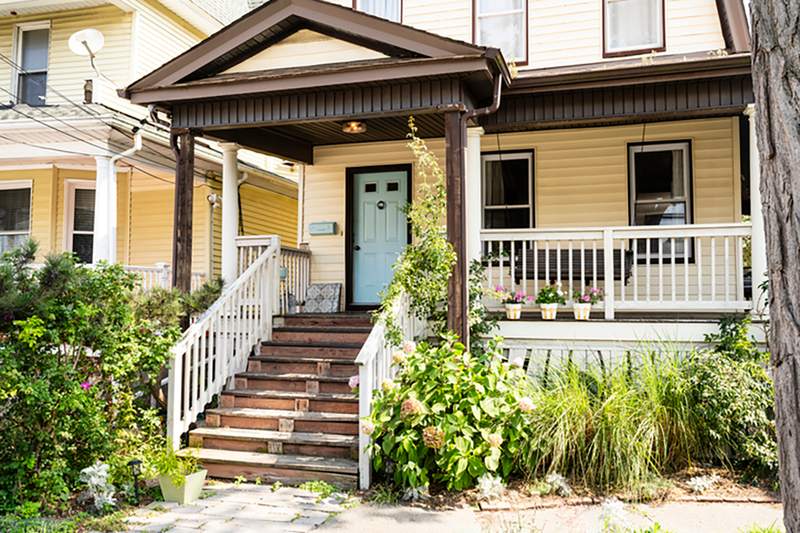When you picture a landlord, you might automatically think of major corporations maintaining homes for renters. There are plenty of businesses out there that own rental homes. But it might surprise you to know that, according to the National Association of REALTORS®, individual property owners manage 77% of two- to four-unit properties. So, it’s entirely reasonable to envision yourself investing in real estate. Here’s how to rent out a house, maximize your investment, and enjoy the related tax benefits.
How To Rent Out Your House: Step-By-Step
Renting out a house involves more than owning a home or finding a tenant. Follow this guide to optimize the opportunity and mitigate problems.
1. Calculate The Cash Flow
First, it’s best to evaluate your financial situation to know what kind of house you can afford and the income you’ll need to make the effort worthwhile. Then, you can set your goal for cash flow from the rental property. Remember, calculating costs means including the mortgage, property taxes, maintenance, renovations, insurance and marketing fees. These items detract from the rental payments, decreasing profits.
In addition, because the ROI in real estate depends on the market, renting may not be the best option. It’s recommended to contemplate selling versus renting your house to see how to maximize your return. Renting provides a steady stream of income over time, while selling provides a lump sum payment. So, renting makes sense if you can develop a healthy cash flow.
For example, say you buy a house for $250,000 and repair it for $15,000. Now, its new sale price is $300,000. So, you could sell it and collect a $35,000 profit. However, after researching the market, you realize you could rent out the house for $2,000 per month. This price means you could surpass the profit of selling the home after 18 months of rental income. Therefore, renting is more profitable in this situation unless you’re desperate for cash for the next year and a half.
2. Learn The Laws
It is crucial for landlords to have a thorough understanding of federal, state and local landlord-tenant laws for several reasons:
- Compliance with the law: Landlord-tenant laws protect the rights of both parties and ensure a fair and equitable relationship. By knowing these laws, landlords can comply with legal requirements and avoid potential violations that could lead to legal consequences, fines, or even lawsuits.
- Tenant rights protection: In addition, understanding relevant laws, such as the Fair Housing Act, helps landlords to be aware of the rights and protections afforded to tenants. This knowledge enables landlords to treat tenants fairly, avoid discrimination, and provide adequate living conditions as the law requires. By respecting tenant rights, you can establish positive landlord-tenant relationships and maintain a good reputation.
- Effective lease agreements: Local laws often prescribe specific provisions or requirements for lease agreements. By being knowledgeable about these requirements, landlords can create legally sound and comprehensive lease agreements that protect their interests and clearly outline the rights and responsibilities of both parties. Doing so helps prevent misunderstandings, disputes, and potential legal issues.
- Handling disputes and conflicts: Disputes between landlords and tenants can arise during the tenancy. Knowing the applicable laws gives landlords the necessary information to address these disputes and find lawful resolutions. This knowledge helps you navigate rent increases, security deposits, repairs, evictions, and lease terminations per the law.
3. Get Insurance
It’s vital to purchase landlord insurance, also called rental property insurance, to protect your investment. Like homeowners insurance, this coverage protects the rental property’s structure (the building, walls, roof, etc.) from perils such as fire, lightning, windstorms, hail, vandalism, or other specified events. It may also cover additional structures on the property, such as garages or sheds. Plus, your policy can include any personal property that maintains or services the property, such as appliances or tools.
Furthermore, suppose the rental property becomes uninhabitable due to a covered event (for example, fire or severe damage). In that case, rental property insurance can cover the loss of rental income during the repair or rebuilding period.
In addition, the policy helps if tenants, guests, or other individuals suffer harm while on the rental property. It can assist with legal fees, medical expenses and potential settlements or judgments resulting from such liability claims.
Remember, rental property insurance may not cover specific situations, such as tenant negligence or intentional damage. Additionally, specific policy terms and coverage limits can vary, so reviewing your policy and understanding what is covered and excluded is essential.
Home Affordability Calculator
Calculate the home price you can afford using your income and the amount of debt you have.
4. Research The Market
Next, researching the market to determine a competitive rent price is crucial to finding a tenant and generating income. Otherwise, you could price yourself out of the market with an expensive rate or leave money on the table if the local fair market rent is hundreds of dollars higher.
Fair market rent refers to the rental rates in the 40th percentile in a particular area or housing market under normal, competitive conditions. These rates depend on location, property type, size, condition, amenities, and prevailing rental market trends. In addition, the U.S. Department of Housing and Urban Development (HUD) uses fair market rents to determine the maximum rental subsidies for various federal housing programs, such as the Section 8 Housing Choice Voucher program. This way, eligible low-income individuals and families can access decent and affordable housing in their area.
Fair market rents also allow tenants and landlords to compare rental rates in a specific market. Prospective tenants can assess whether a rental rate is reasonable based on the fair market rent for similar properties in the area. Therefore, you can refer to your local fair market rent rate when setting rental prices for their properties.
Lastly, real estate agents use fair market rents to analyze rental market trends and estimate property values. So, hiring one to negotiate with renters on your behalf can save you time and effort while abiding by a stable rental standard.
5. Prepare The Property
When you convert your home into a rental, it’s vital to get your property ready to rent. Doing so includes renovations, improving the curb appeal, and ensuring the property is up to code. Here’s a checklist of tasks before making the property available for renters.
- Do a deep clean. The place should be sparkling from top to bottom before you open the doors to a renter. A clean start encourages the renter to keep the home clean. You can hire professional cleaners to make the property shine.
- Ensure the appliances are working well. The appliances in your rental don’t need to be new, but they should be reliable. If an appliance isn’t reliable, then now is the time to replace it.
- Inspect the property for maintenance needs. Take the time to inspect the flooring, roofing, plumbing, HVAC, paint, and windows to confirm everything is in working order. If something is not up to your standards, you should add it to a list of repairs before finding a tenant.
- Spruce up the curb appeal. Everyone wants to live in a lovely home with lots of curb appeal. Consider upgrading your outdoor landscaping to entice potential renters.
- Double-check the safety features. Many states require landlords to install specific safety equipment. For example, railings and smoke detectors are usually necessities. Confirm that your property is compliant with state laws.
Getting a property ready for rent takes time, and tackling the projects upfront is best. Otherwise, it will only be a matter of time before you receive a call from an unhappy tenant.
6. Market The Property
Finding the right tenant can be tricky, but you can expand your opportunities by doing more than just putting a “house for rent” sign outside the home. Good marketing is critical to securing the right tenant.
It’s essential to create a listing for the property that highlights all the home’s valuable amenities. Start with a slideshow of professional photos illuminating the home’s best features. In addition, a 360-degree virtual walkthrough and vibrant description of the home can highlight what matters most to renters. In addition, you can get more exposure by posting to various rental websites, including apartments.com and Zillow.
7. Find And Screen Tenants
A sufficient application and screening process is necessary for finding a suitable tenant. It might be tempting to rent the home to the first renter that shows interest, but screening tenants helps ensure they’ll be a good fit.
First, you’ll want to know how many people will be living on the property. Additionally, it’s crucial to ask about employment, income, and credit score. You can verify this information with pay stubs and credit reports. You can also run a background check to see if the individual for criminal history and past evictions.
If a potential tenant’s situation causes unease, you may ask for references to assess the individual’s character. Remember, the goal of screening is to ensure that the potential tenant is able and willing to pay rent on time while keeping the property reasonably clean. Therefore, it helps to have minimum standards, such as a specific credit score and/or proof of income, before meeting with potential tenants.
See What You Qualify For
Buy A Home
Discover mortgage options that fit your unique financial needs.

Refinance
Refinance your mortgage to have more money for what matters.
Tap Into Equity
Use your home’s equity and unlock cash to achieve your goals.
Tips For Renting Out A House
Being a good landlord is as vital as finding a responsible tenant. To that end, here are some tips to make renting out a house the best experience possible:
- Use a property management company: A property management company takes the pain out of managing property by performing essential tasks like screening tenants, collecting rent, and handling tenant complaints. This kind of company makes scaling a rental business realistic if you plan on renting out multiple properties.
- Work with an attorney: A real estate attorney can craft landlord-tenant contracts, conduct title searches on homes you’re interested in purchasing, and represent you in legal disputes.
- Collect security deposits: Security deposits are charges landlords impose, usually in the form of one or more months of rent, to protect themselves from risk. This way, the tenant makes a financial commitment, and you can use the money for repairs or compensation if the tenant damages the property or violates the contract.
- Perform property inspections: Regular inspections help ensure the house stays in excellent condition. You can perform these during a tenant’s stay and in between tenants. If an issue arises with the unit, it’s best to immediately address it to preserve your property value and maintain its appeal to new renters. For example, you may need to perform landscaping, painting, patching drywall, or fixing appliances.
- Set up a maintenance tracking system: A maintenance tracking system will help you stay organized and efficiently process maintenance requests. This tool is beneficial if you have multiple properties. Otherwise, dealing with dozens of calls about problems among different properties can cause issues to slip through the cracks.
- Obtain a license: Some states require a rental license. So, it’s critical to research your state laws and apply for one if necessary.
Tax Deductions For Landlords
Landlords receive specific tax deductions and benefits for renting out their property. Remember, the IRS considers rental income standard income (like what you earn from your day job). Fortunately, you can deduct numerous expenses to lighten your tax burden.
Specifically, you can deduct mortgage interest, property taxes, depreciation, repairs and property taxes. In addition, you can deduct expenses necessary for running your rental business, including advertising, legal and account fees, travel, supplies, and insurance. Repairs the tenant pays for are also deductible for landlords. However, improvements are not deductible.
The Bottom Line
Renting out a house requires thorough planning, knowledge of legal obligations, and proactive measures to protect your investment. In addition, landlords can optimize their opportunities and mitigate potential problems by evaluating their financial situation, understanding landlord-tenant laws, obtaining rental property insurance, and researching the local market.
Additionally, you’ll benefit from thorough property preparation, effective marketing strategies, tenant screening and utilizing tax deductions to reduce taxable income. By implementing these measures, you can navigate the rental process successfully and maximize the benefits of renting out a house.
Ready for a change?
Find top-rated movers and compare multiple quotes on HomeAdvisor.

Ashley Kilroy
Ashley Kilroy is an experienced financial writer who writes for solo entrepreneurs as well as for Fortune 500 companies. She is a finance graduate of the University of Cincinnati. When Ashley isn’t helping people understand their finances, you may find her cage-diving with great whites or on safari in South Africa.












